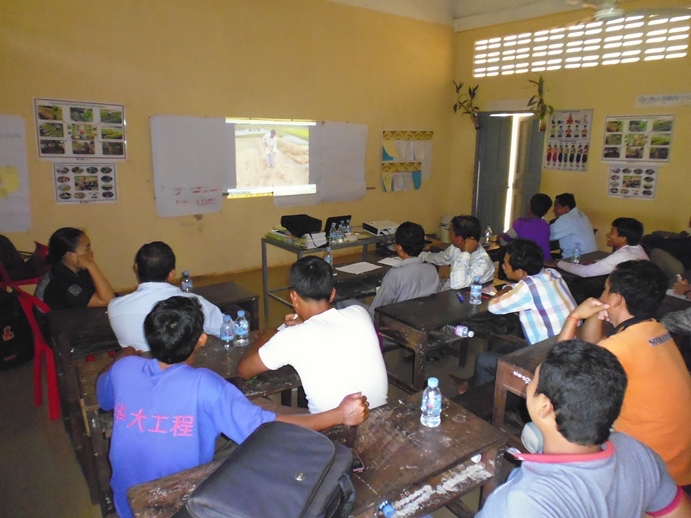Sustainability Projects
One of the best gifts of education is the freedom to choose one's future. In this way, education creates sustainability because it allows one to perpetuate that choice. Thus, education frees one to become self-sufficient.
Over the decade since we built the middle school to honor Doris Dillon's legacy, we have worked to find ways to allow village families to choose a better future for themselves that they can sustain.
The following are some ways in which we've tried to make that happen.
SRI Training: Improved Rice Yields:
(photo: farmers are trained by CEDAC in our classroom)
In August 2017, 25 village farmers were trained by CEDAC, a French NGO (http://www.cedac.org.kh/ ), to grow rice using CEDAC's SRI (System of Rice Intensification) techniques which routinely increase yields by over 50% without the use of expensive fertilizer.
Twenty-six of the 41 middle school and high school girls we currently provide scholarships for who had all dropped out of 7th grade own less than a hectare of land--too little to grow enough rice on to sustain themselves. Growing rice using CEDAC's SRI techniques can dramatically improve their lives in a sustainable way.
Sofie Gmerek, a Leland High School San Jose sophomore, raised money to fund CEDAC's SRI training of the 25 local farmers as a part of her Girl Scout Gold Award project. In February 2018, she will travel to our school to work with the farmers who were trained to plant a demonstration garden. The garden will be planted with plots of rice grown using SRI techniques next to rice grown using traditional methods. As both plots grow, other farmers can readily witness the benefits of employing the SRI method. During the rice-planting season, which begins in May, the trained farmers will train interested farmers in the SRI techniques.
Heifer International Animal Pass-On Program:
(photo: Heifer Cambodia headquarters)
We met with Heifer Cambodia executives and arranged training for three of our teachers to administer Heifer International's Animal Pass-On Program. The teachers would train three families to raise a pair of animals. When that pair has offspring, a pair of the offspring is given to both families, on condition that they arrange training for two more families each.
School Uniform Sewing Business:
(photo: Asia Tailor in Phnom Penh's Russian Market).
We have wanted to help start a women's school uniform sewing business. We've discussed this with the two brothers who own the tailoring business, Asia Tailor, in Phnom Penh's Russian Market. They felt they could find five used sewing machines and an embroidery machine to manufacture students' white school uniform blouses and shirts.
We contacted Tony Castley, founder of SewAid, (http://www.sewaid.com), to ask for his advice and his organization's help in creating a women-run school uniform sewing business and provide training for employees.
We feel a school uniform business could be a win-win situation: village families buy uniforms more cheaply than before from neighbors in their village who benefit from learning new skills that can improve their family's lives.
Because uniforms are sold so cheaply, we are now researching how to migrate from subsidizing the salaries of village women and cost of materials to creating a business that can support itself after initial help from us.
Students build a bridge:
(photo: girls work on building a bridge over a culvert).
Board member Ken Colson, a man of the post-spry generation (he'd be considered a village elder if he was Cambodian), lamented that he had to cross a rickety system of planks to visit the home of Heung Mai, an 8th grade girl who is attending our school on a scholarship that he provides. He visited her home to meet her family and to witness the poverty that had caused her to drop out of 7th grade.
When Ken almost fell crossing the planks over a culvert that helps prevent flooding during monsoon season, he talked with our principal Mey Cheoun about building a bridge to create a safer crossing. After all, Ken reasoned, many students use the makeshift bridge each day.
Ken left matters in Mey Cheoun's hands and less than a month later, Mey Cheoun assembled resources, student labor (yes, other boys and girls) and built the bridge seen in the photo, a lasting solution to a 'shaky' situation.
CPR, First Aid, Pre-Natal, and Infant Care Training
(not pictured) In February 2018, Sofie Gmerek, a Leland High School San Jose sophomore will conduct this training for her Girl Scout Gold Award project. Volunteers accompanying her will help 'train the trainers' so that teachers, high school students, and villagers will be prepared to continue the training for all village families. Sofie will leave behind CPR dummies and other equipment, purchased through her fundraising, for trainers to use.




